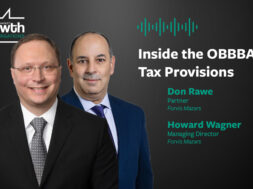Middle-Market Public Policy Roundup
The Fed expands the Main Street Lending Program, the SBA issues affiliation rules guidance, the House expands loans to small business, and more.

In this week’s roundup, the Fed expands the scope of its Main Street Lending Program and the Small Business Administration issues guidance that clarifies some aspects of its affiliation rules. Plus, the House passes a bill expanding the small business loan program, the SEC prepares for upcoming advisory committee meetings, and the Fed votes on interest rates.
Fed Expands Scope and Eligibility of Main Street Lending Program
The Federal Reserve Board announced it is expanding the scope and eligibility for the Main Street Lending Program, according to a published on Thursday.
Established by the Coronavirus Aid, Relief, and Economic Security Act, or CARES Act, the Main Street program was first announced earlier this month.
In response to public input on the program, the Fed said it will expand the loan options available to businesses and increase the maximum size of businesses that are eligible for support under the program.
According to the press release, the Fed will create a third loan option, with increased risk sharing by lenders for borrowers with greater leverage. It will also lower the minimum loan size for certain loans to $500,000, and it will expand the pool of businesses eligible to borrow.
Under the revised rules, businesses with up to 15,000 employees or up to $5 billion in annual revenue are now eligible for Main Street loans, according to the Fed. The initial program terms limited participation to companies with up to 10,000 employees and $2.5 billion in revenue.
After the program was first announced on April 9, the Association for Corporate Growth submitted a letter to the central bank outlining a number of issues in the program that could prevent middle-market businesses from accessing funds.
Ambiguity Remains on PPP Eligibility After New SBA Rule Surfaces
Private equity firms received new guidance from the Small Business Administration on whether their companies are able to receive aid from the Paycheck Protection Program, but some ambiguity remains.
In a pre-published interim rule released on April 24, the SBA offered clarification on PPP requirements, with some directed to private equity firms and their portfolio companies.
Since PPP received additional funding from the multitrillion-dollar CARES Act in late March, confusion surrounded eligibility requirements for companies with private capital ownership.
Private equity firms have been trying to get the SBA to clarify its position on whether companies backed by private capital are eligible for PPP loans.
The new rule makes it clear that private equity and other types of investors themselves are not eligible to receive PPP payments directly. According to the SBA, private equity firms are “primarily engaged in investment or speculation,” and are therefore ineligible to receive a PPP loan.
However, private equity firms had requested the SBA to clarify its position on affiliation rules, which as currently constructed prevent many PE-backed companies from receiving PPP loans because it categorizes all businesses under a private equity owner as subsidiaries of a single company.
The current rule has done little to clear up questions over affiliation rules.
According to law firm White & Williams, private equity portfolio companies remain eligible to receive a PPP loan if they satisfy the size requirements after application of SBA’s affiliation rules.
“As a practical matter, a portfolio company that is majority owned by a fund will not be eligible unless it either still qualifies after applying the affiliation rules or is exempt from the affiliation rules,” White & Williams’ Ryan Udell and Adam Chelminiak wrote in a recent article.
While affiliation rules apply to private equity-owned businesses in the same manner as any other business subject to outside ownership or control, according to the SBA, these rules are waived if the borrowing company receives financial assistance from the SBA from other sources—which was the understanding of many private equity firms before the most recent rulemaking.
The rule went into effect when it was published in the Federal Register on April 28, but the SBA will continue to accept public comments until May 28.
House Passes Stimulus Extension
After an overwhelming majority vote, lawmakers approved nearly half a trillion dollars in additional stimulus funding to support businesses impacted by the COVID-19 outbreak, which was signed into law last week.
By a vote of 388 to 5, and one abstaining, on April 23, the House approved a $484 billion extension to federal relief efforts. As expected, President Trump signed the bill—the Paycheck Protection Program and Health Care Enhancement Act—into law the following day.
The lion’s share of the aid package—$320 billion—will replenish the Small Business Administration’s Paycheck Protection Program. The SBA began accepting PPP applications on Monday, almost two weeks after funding for the program was exhausted.
“The PPP has supported more than 1.66 million small businesses and protected over 30 million jobs for hardworking Americans. With the additional funds appropriated by Congress, tens of millions of additional workers will benefit from this critical relief,” Treasury Secretary Steven Mnuchin and SBA Administrator Jovita Carranza said in a statement following the resumption of PPP activities on April 27.
Despite federal efforts, U.S. employers continue to shed jobs at an unprecedented rate. According to latest estimates from the Department Labor, an additional 3.8 million workers filed for unemployment, bringing the total up to nearly 30 million.
SEC Advisory Committees Meet Next Week
The Securities and Exchange Commission today released the agenda for two advisory committee meetings that will occur next week.
The Commission’s Investor Advisory Committee will hold a remote public meeting on May 4 and the Small Business Capital Formation Advisory Committee will meet on May 8.
Investor Advisory Committee members are expected to discuss public company disclosure considerations during the COVID-19 pandemic, and public company shareholder engagement and virtual shareholder meetings.
The Small Business Capital Formation Advisory Committee will discuss the commission’s recent capital formation proposal, which proposes amendments to simplify, harmonize and improve certain aspects of the exempt offering framework.
During the meeting, the committee will also continue its discussion from April 2 on how small businesses are coping with COVID-19 and share observations from their areas of the marketplace.
Fed Holds Interest Rates in First Scheduled Meeting Since Start of Coronavirus Pandemic
In its first scheduled meeting since the start of the coronavirus pandemic, the Federal Reserve voted to keep interest rates at near-zero levels.
At the end of its two-day meeting on April 29, the Federal Open Market Committee unanimously decided to maintain the target range for the federal funds rate at 0% to 0.25%.
“The ongoing public health crisis will weigh heavily on economic activity, employment, and inflation in the near term, and poses considerable risks to the economic outlook over the medium term,” the committee said in a statement.
The committee said it expects to maintain interest rates at this target range until it’s confident that the economy has weathered recent events.
The central bank’s governors held two emergency meetings in March, and met an additional three times to establish liquidity vehicles to prop up credit markets.
To support the flow of credit to households and businesses, the Fed said it will continue to purchase Treasury securities and agency residential and commercial mortgage-backed securities.
Warren, Ocasio-Cortez Draft Bill to Block M&A
Two Democratic lawmakers announced plans to introduce a bill that would block large mergers and acquisitions as the U.S. copes with the fallout from the coronavirus pandemic.
According to reporting from The Hill, Sen. Elizabeth Warren, D-Mass., and Rep. Alexandria Ocasio-Cortez, D-N.Y., are drafting the The Pandemic Anti-Monopoly Act to prohibit M&A deals that involve companies with more than $100 million in revenue, those owned by hedge funds or private equity, or businesses with patents relevant to the coronavirus outbreak.
The bill would freeze M&A transactions until the economic crisis in the U.S. abates.
The chairman of the House Judiciary antitrust subcommittee, Rep. David Cicilline, D-R.I., also has suggested adding a provision to future stimulus legislation that would halt M&A activity, The Hill reported.

Benjamin Glick is Middle Market Growth’s associate editor.


